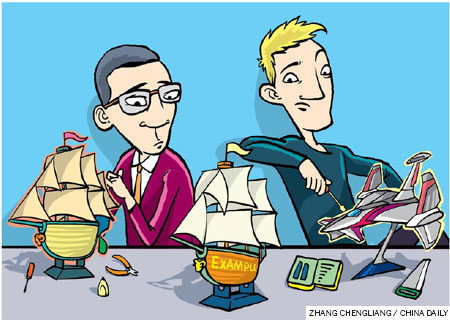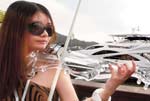View
Books don't hold all the answers
Updated: 2011-03-23 07:41
(China Daily)

Freeing college students of the written word can create excitement and panic
Since I was a child I've loved libraries. There was something about the quiet solitude of row after row of books and the unique smell of paper and ink that made me feel at ease. I guess you could say I'm a bit obsessed with books and the written word.
When I was in university, few of my classmates shared my obsession. More often than not their minds were obsessed with other things. Believe me, the only time there was a crowded Friday at the university library was during finals.
After teaching at Chinese universities for six years I think it's safe to say Chinese students are more obsessed with books than their counterparts in the United States.
It's an historical part of education in China. Ever since Emperor Wu of the Western Han Dynasty (206 BC-AD 24) created an imperial university to test and train officials in the Confucian classics, Chinese students have had their faces planted in books for an ungodly number of hours each day, preparing themselves for a test that evaluates how well they have memorized the endless stream of words and formulas stuffed into their brains.
Of course, times have changed, but it seems old habits die hard. Every time I ask a question in class, the majority of my students stick their faces in their books to search for an answer. "The answer's not always in the book," I tell my students, before asking them to close their books.
At first they scratch their heads, but when they begin to think and process information into comments and ideas, class discussion become livelier and many students even see the usefulness and application of information beyond a test.
In short, the series of tests that determine the progress of a Chinese student has created a forced obsession with books in China. This in turn has created an interesting dichotomy for education in China that affects both Chinese students and educators.
China's eager and bright minds long to move beyond the rigid and formulaic information of textbooks. Every time I have them do an activity outside of the book, there is always excitement in their eyes. However, if you go outside of the book for too long their excitement turns to worry.
"Can you summarize the most important points of this class so we can study them?" "How is this related to the book?" "Will this be on the final test?" At first the questions are just a few pot shots here and there, but with each successive day the book is not used they quickly turn into heavy machine gun fire.
I've talked to many teachers and professors at Chinese universities who don't have complimentary comments about such a system, but in the end most fall in line. The other day I was talking with a Chinese educator about a book I was supposed to use in my Western culture class.
"I don't like it," I said. "Chinese people already know Western culture is different, what they really want to know is why it's different and the book doesn't explain that."
"Yes," my friend replied. "I know the book is probably too simple, but you know you have to use it. It's the traditional Chinese way. You have to have a book to test the students on, otherwise the class is no good."
Immediately I felt the need to jump on a soapbox and scream to the heavens that people's minds should never be limited to the four corners of the pages of a book. I soon realized such a feeling was just plain silly. After all, who would listen to me?
In the end the best solution might be to just let Chinese and American students learn from each other. They can start by trading obsessions.
The author teaches English at Beijing Foreign Studies University. To comment, e-mail metrobeijing@chinadaily.com.cn. The views expressed here do not necessarily reflect those of METRO.
Specials

In the swim
Out of every 10 swimsuits in the world, seven are made in China.

Big spenders
Travelers spend more on shopping than food, hotels, other expenses

Rise in super rich
Rising property prices and a fast-growing economy have been the key drivers.